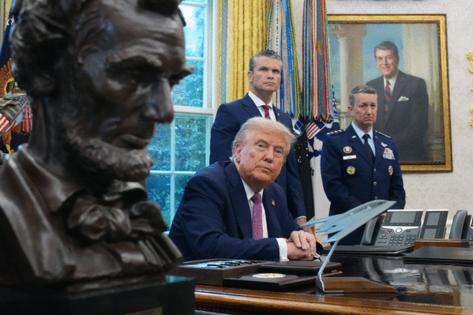Andreas Kluth: What the White House doesn't get about 'war'
Published in Op Eds
I have no problem with renaming the Department of Defense into the Department of War, as Donald Trump is trying to do. (It’s technically not up to the president but to Congress, but the Republicans there will oblige him.) After all, that martial label was good enough from George Washington to Harry Truman. And “war” is more honest and descriptive than the somewhat euphemistic “defense.” As Trump put it, “we want to be offensive too if we have to be.” Even that holds water.
But that’s the end of my concurrence with this cosmetic and ridiculous stunt of showmanship. Trump likes to rename things — the Gulf of Mexico/America and such — because doing so looks bold while skirting the complexities and nuances of real policy. Naming is part of turning his presidency into reality TV, and it works to the extent that it grabs our attention. But a new shingle (and URL) outside the Pentagon does not solve the fiendish challenges of running the Army, Navy, Marine Corps, Air Force, Coast Guard and Space Force. Nor does it signal anything, positive or negative, about strategy.
Strategy — the word comes from the Greek strategos, meaning “general” or “commander” — is the domain that Trump and his Secretary of War, Pete Hegseth, should be concerned with but aren’t. The Prussian strategist Carl von Clausewitz famously wrote that war is the continuation by other means of policy — or of politics, the German word Politik could mean either. That has often been misinterpreted as a cynical endorsement of warfare. In fact, Clausewitz meant something closer to the opposite: the need to limit war and subordinate it to achieving clearly defined political objectives. This is what Trump and Hegseth don’t get.
When Trump announced the name change, Hegseth, the Fox News personality who is all-in on Trump’s reality-TV shtick, bloviated again that the new label expresses the “warrior ethos” that he and the president are trying to revive after its alleged near-death under “woke” leaders and elites. The Department of War, Hegseth said, is henceforth about “maximum lethality, not tepid legality, violent effect, not politically correct. We’re going to raise up warriors, not just defenders.”
To people who think deeply about war, and know that it is hell, this vacuous bellicosity is hard to bear. Christopher Preble, who runs a “grand strategy” program at the Stimson Center in Washington, thinks that the Trump-Hegseth obsession with lethality “risks a focus on killing for killing’s sake, and comes at the expense of strategic clarity.”
Even and especially when a nation has the most powerful military in world history, its leaders need humility and wisdom in deploying that force. America didn’t lose in Iraq and Afghanistan because it was insufficiently lethal — “because it didn’t kill enough Iraqis and Afghans,” as Preble puts it — but because it lacked a strategy that was well considered, realistic and attainable.
What is observable during the second Trump administration so far is not the alignment of military and other means to clearly defined ends, but random displays of violence intended to shock and awe audiences foreign and domestic and to keep up the ratings on the reality-TV presidency.
Thus, Trump just ordered a military strike on a skiff in the Caribbean, killing the 11 men on board, who may or may not have been drug smugglers and whom Trump called “terrorists.” Normally, the Coast Guard would have picked up and dealt with such people. The strike was almost certainly unlawful (notice Hegseth’s disdain for “tepid legality”). But it made for a suspenseful video clip, which Trump of course shared, hinting of more strikes to come.
He and Hegseth seem equally ready to use war — the word and the threat — at home. The president has already deployed the National Guard in some American cities he considers disloyal, forcing Hegseth’s warriors to take a break from lethality to pick up trash and blow leaves. Chicago could be next and, as Trump posted, is “about to find out why it’s called the Department of WAR.” He illustrated his threat with an AI image of himself à la Apocalypse Now, with Chicago in the background in place of a burning Vietnam.
This is the same president who habitually confuses aggressor and victim in the war between Russia and Ukraine. Who keeps alienating America’s brothers-in-arms, most recently by ending training programs in Lithuania, Latvia and Estonia, NATO’s front line facing Russia. Who drives a potential ally, India, into the arms of America’s likeliest adversary, China. Who lacks any observable notion of grand strategy — that is, of a plausible plan to Keep America Great and achieve peace through strength.
So go ahead and rename that department. And do prepare for war. But do so with the goal of preventing war, as Harry Truman did when he chose the label “defense” just after witnessing the full genocidal and even nuclear horror of World War II. He and other American leaders of his time had glimpsed hell and wanted to save humanity from it. They hated war far too much to play with the word.
With or without bone spurs, Trump can’t keep impersonating a warrior while calling himself the President of PEACE. And America can’t keep letting him disdain strategy for the sake of show.
____
This column reflects the personal views of the author and does not necessarily reflect the opinion of the editorial board or Bloomberg LP and its owners.
Andreas Kluth is a Bloomberg Opinion columnist covering US diplomacy, national security and geopolitics. Previously, he was editor-in-chief of Handelsblatt Global and a writer for the Economist.
©2025 Bloomberg L.P. Visit bloomberg.com/opinion. Distributed by Tribune Content Agency, LLC.
























































Comments